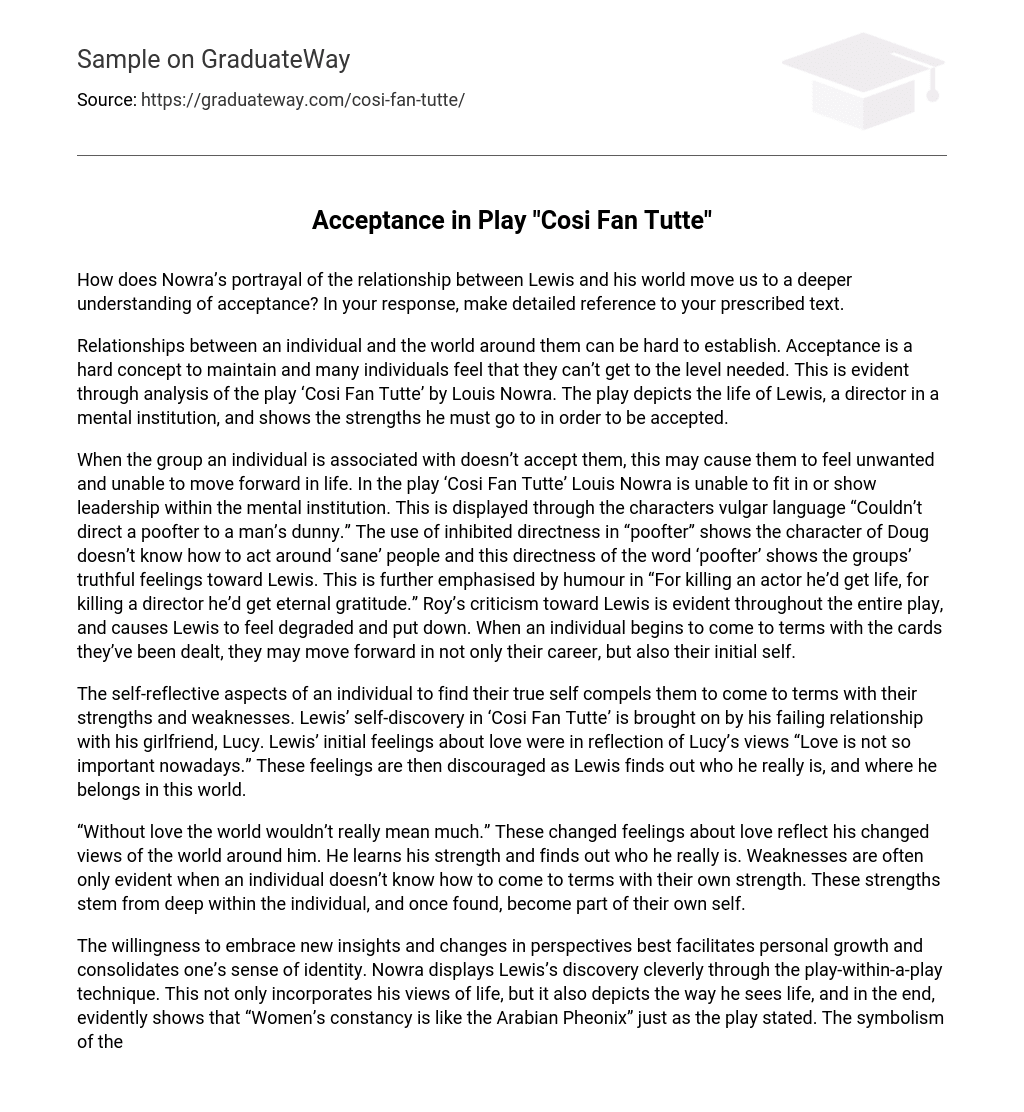Nowra’s portrayal of Lewis and his world delves into the theme of acceptance. This exploration prompts us to consider the context of Lewis’s experiences in order to gain a deeper understanding of acceptance. By referencing our prescribed text, Nowra enables us to comprehend how this relationship ultimately transforms Lewis.
Establishing connections between oneself and the surrounding world can present difficulties. Maintaining acceptance poses a challenging notion for many people, who often perceive it as unachievable. The play ‘Cosi Fan Tutte’ by Louis Nowra serves as evidence of this predicament. It portrays the story of Lewis, a director within a mental institution, and highlights the extreme measures he must undertake in order to gain acceptance.
The play ‘Cosi Fan Tutte’ by Louis Nowra demonstrates how rejection from one’s social group can result in feelings of being unwanted and hinder personal development. In the play, the character Lewis struggles to fit in or assert himself at a mental institution, which is exemplified through his use of vulgar language such as “Couldn’t direct a poofter to a man’s dunny.” This language reveals his discomfort and unfamiliarity with ‘normal’ people while also exposing the true sentiments of the group towards him. Roy further emphasizes this criticism humorously when he says, “For killing an actor he’d get life, for killing a director he’d get eternal gratitude.” Throughout the play, Roy consistently belittles and demeans Lewis, causing him to feel demeaned. Accepting their circumstances enables individuals to make progress not only in their career but also in personal growth.
The process of self-reflection can guide individuals in uncovering their true identities and recognizing both their strengths and weaknesses. This is evident in the play ‘Cosi Fan Tutte’ where Lewis experiences a transformative journey of self-discovery amidst his deteriorating relationship with Lucy. Initially, Lucy’s viewpoint influences Lewis’s perception of love and its lack of importance in contemporary society. Nevertheless, as Lewis delves deeper into understanding his own sense of self, he ultimately uncovers his genuine identity and discovers his rightful place within the community.
Without love, the world would be devoid of purpose. The evolving perspectives on love signify a shift in our perception of the surrounding world. By comprehending ourselves deeply and discovering our inner fortitude, we acquire valuable wisdom. Frequently, individuals become aware of their vulnerabilities solely through grappling with their potential. These strengths originate within us and ultimately shape our identities.
The play-within-a-play technique employed by Nowra effectively showcases Lewis’s discovery, allowing us to witness his perspectives on life and how he perceives it, which in turn facilitates personal growth and solidifies his sense of identity. The play suggests that Women’s constancy is akin to the Arabian Phoenix, emphasizing its significance. Furthermore, Lewis’s transformation is symbolized by the theatre being engulfed in darkness. To truly embrace acceptance, Lewis must venture beyond his usual boundaries and fully immerse himself in the realm of the mental institution.
In the absence of light, his perception and thoughts undergo a profound transformation. This transformation persists even after the lights are restored. The conclusion of the play, represented by the [beat], also signifies Lewis accepting this change as he recognizes that he has successfully embarked on a journey to discover his authentic self. Before being accepted into broader spheres, it is crucial to embrace one’s own identity. These spheres may consist of individuals with varying levels of acceptance or like-minded individuals who share similar realizations.
Accepting oneself and believing in one’s identity is a prerequisite for society’s encouragement of acceptance in all aspects of life. The analysis of ‘Cosi Fan Tutte’ supports this idea and helps Lewis recognize and sustain his self-acceptance.





